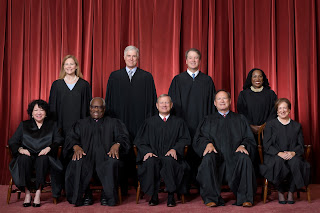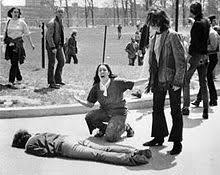Even though you might see the right or wrong of a thing, that does not mean you cannot see how your opponent draws his own conclusion, opposite to your own.
 |
| Obadiah Youngblood |
Yes, this is another blog post about separation of church and state, so you can move on if you have had your fill of that. But it's really not so much about this particular issue as how arguments are constructed and how lines get drawn.
During the Deliberative Session a supporter of the warrant articles granting taxpayer funds to a church school said, "We do not send the fire department to extinguish fires only at public schools." There is a principle of "Mutual Aid" which allows for this. You don't rescue people at the beach only after asking about their religion.
But, of course, the argument here is not about doing something we provide all citizens equally, but about doing something special for one school, a church school.
The Supreme Court struggled with this in its "Everson" decision, written by Justice Hugo Black. He addressed the two poles of arguments about funding, directly or indirectly, church institutions. The Court has oscillated between "neutrality" of government when faced with religious institutions and "strict separation" or "erecting a wall."
In the Everson case, a town in New Jersey decided to pay for school bus transportation for all students in the town to take them to their schools, but a citizen sued saying he did not want his taxes paying for transporting kids to church schools where they would be taught religion.
Writing the majority opinion, Black said,
"Similarly, parents might be reluctant to permit their children to attend schools which the state had cut off from such general government services as ordinary police and fire protection, connections for sewage disposal, public highways and sidewalks. Of course, cutting off church schools from these services, so separate and so indisputably marked off from the religious function, would make it far more difficult for the schools to operate. But such is obviously not the purpose of the First Amendment. That Amendment requires the state to be a neutral in its relations with groups of religious believers and non-believers; it does not require the state to be their adversary. State power is no more to be used so as to handicap religions, than it is to favor them.
This Court has said that parents may, in the discharge of their duty under state compulsory education laws, send their children to a religious rather than a public school if the school meets the secular educational requirements which the state has power to impose. . . . It appears that these parochial schools meet New Jersey’s requirements. The State contributes no money to the schools. It does not support them. Its legislation, as applied, does no more than provide a general program to help parents get their children, regardless of their religion, safely and expeditiously to and from accredited schools."
So Black was arguing the "neutrality" justification. The town had not favored church schools, it simply offered to the church schools and their students what it had decided to offer all students living in the town. It was extending "mutual aid" to all citizens of the town, regardless of their religious beliefs. Paying for cross walk guards to get children safely across the street to the church school is not to embrace church doctrine, but to protect public safety.
 |
| Leclerc |
In the Sacred Heart School case, the facts, the circumstances are different: the town set up an account which the church can draw upon to buy whatever it likes: computers, paper supplies, textbooks. There has been testimony over the years from the town official, the treasurer of the SAU school district, that she has never refused to pay for an invoice presented by the church. It is not clear that invoices for crucifixes were never presented, but it is clear the computers could have used to stream religious services. It is also clear that the town treasurer, reputedly a graduate of Sacred Heart School, has over the decade or so she has been writing these checks never declined to pay for the invoices.
 |
| Munch, "The Scream" |
Even in Everson, the phrase "non religious purposes" was floated, as if you can separate out normal maintenance of the church school building a "non religious purpose." If the town decided to pay an invoice for a new roof for the school, would that be a non religious purpose and therefore not a problem?
In the "Carson" case from Maine, the Court ruled beyond "Everson," by saying if you were going to fund any private school, pay tuition for any private school, you had to do that for a school which teaches religion. To deny a religious school taxpayer money while allowing a nonsectarian school public funds is to discriminate against religioun, and goes beyond neutrality to active opposition. In "Carson," of course, we are no longer talking about "mutual aid," (putting out a fire, paving all playgrounds in town or providing transportation to all students) in "Carson" you are paying a school to teach religion to its students.
The Roberts Court took up the cry of "discrimination against religion" in its "Carson" ruling. The ghost of Black's admonition the First amendment "does not require the state to be the adversary" of religion; it requires only neutrality.
But, of course, now we are talking about what a sacred script means, and when you start examining Constitutional scripture, you are going back to origin stories, and reading people like Madison and Jefferson, and they clearly were appalled by the nefarious things organized religion had done in the colonies, and they wanted to be sure taxpayers, non believers, free Americans were not required to support organized religion. So yes, we discriminate against religion, not a particular religion but we discriminate against all religions as a class of entity, in order to remain neutral.
 |
| Provensen |
There were two dissents in Everson, one by Justice Robert O. Jackson, in which he argued that a church would rather give up almost anything than give up its school, because without the school, the church dies in a single generation.
Using that loaded word, "discrimination" in his "Carson" opinion Justice Alito sought to discredit the attempt of the state of Maine to protect the First Amendment.
Justice Rutledge, in his "Everson" dissent argued:
"Of course discrimination in the legal sense does not exist. The child attending the religious school has the same right as any other to attend the public school. But he foregoes exercising it because the same guaranty which assures this freedom forbids the public school or any agency of the state to give or aid him in securing the religious instruction he seeks.
Were he to accept the common school, he would be the first to protest the teaching there of any creed or faith not his own. And it is precisely for the reason that their atmosphere is wholly secular that children are not sent to public schools . . . . But that is a constitutional necessity, because we have staked the very existence of our country on the faith that complete separation between the state and religion is best for the state and best for religion. . . ."
In doing so Rutledge maintained that treating religious schools as just some other form of private education is absurd.
Most of this argument to can traced to a fundamental psychological proposition: Many Americans think religion, all (especially Christian) religion is a good thing, a benefit to society, a guardian of virtue and that all their fellow citizens should embrace this self evident truth. They oppose "godless communism." Their Senators and Congressmen have weekly Bible study groups, and prayer breakfasts. When I was a child, our teachers led us in the Lord's Prayer to start the school day. This was a practice I found downright bizarre as a child, never having heard the Lord's Prayer at home, and my mother told me, "Well, you go to school to learn new things. You may not believe all the things you are taught, but at least you have become acquainted with them."
And the thing which really struck me, especially as I got older, and encountered coaches who knelt down in prayer before a game with their players, as if God wanted Walt Whitman High School to defeat Bethesda Chevy Chase High School, was that the religious folks assumed you agreed with them. They could not understand how anyone could not see God's truth in what they said. Of course God wants Whitman to beat B-CC!
I cannot forget the look on their faces of utter incomprehension at the idea that someone might say, "No, actually, I don't want to pray with you. That's your thing."
When asked for his opinion in public school class about whether dropping the atomic bomb on Japan was a good or bad thing, a classmate replied, "Well, I would ask what Jesus would do," and he smiled beneficently, as if he expected the teacher and all his classmates to join his grinning complacency and cry out, "Hallelujah!"
And I looked around my classroom, at my friends, who I knew thought this guy and his response were ridiculous, and they would suppress smiles and giggles and shake their heads and warn me off from shouting: "Jesus would have no frigging idea what to do! They did not have nuclear weapons in Jerusalem! And if they did, he would have had to ask what the alternatives were, and what the costs were, and what the costs of not dropping the bombs would be."
It was then, in that classroom in Maryland, the ruling folkway that people who profess religious belief are good souls and not to be challenged and certainly not to be denigrated.
 |
| Provensen |
I think, even in New Hampshire, in the 21st century, still much the same.























































